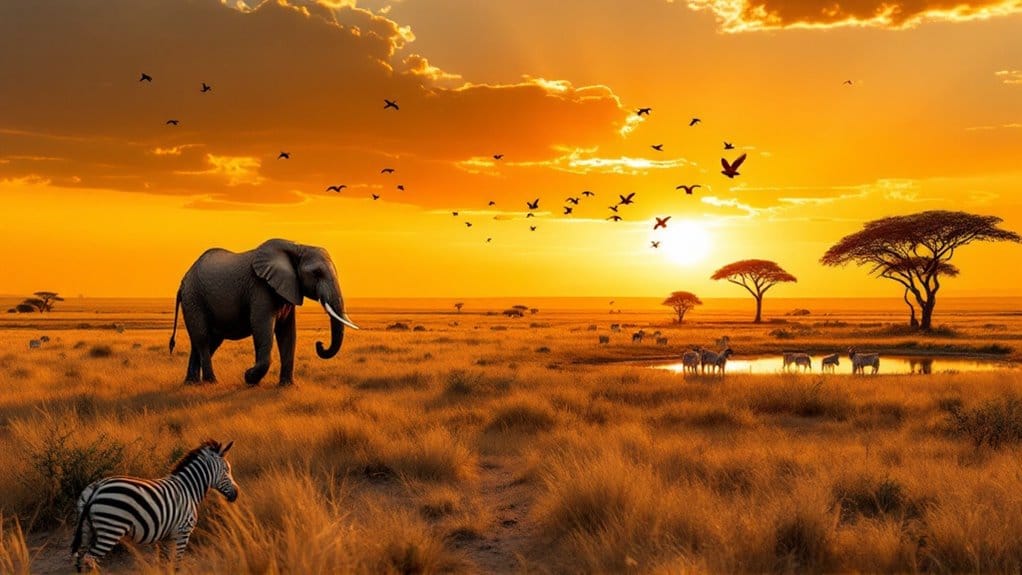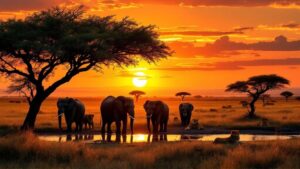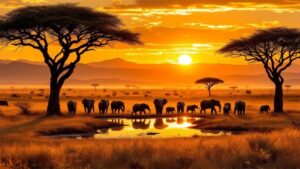What if the future of Africa's majestic wildlife hinged on your choices today? In the domain of safari parks, conservation efforts intertwine with tourism, creating a complex web of economic and ecological impacts. You'll find that initiatives aimed at preserving endangered species often rely on community engagement and sustainable practices. Yet, the challenges these parks face are far from over. As you consider the balance between tourism and conservation, you might wonder how these dynamics shape not only the wildlife but also the very communities that coexist with them.
Key Takeaways
- Africa's safari parks play a vital role in conserving over 100 endangered species through targeted protection programs.
- Revenue from safari tourism supports conservation initiatives, community projects, and sustainable employment opportunities for locals.
- Specific efforts, like the Somali Giraffe Project and Gorilla Doctors, focus on monitoring and caring for endangered species.
- Community engagement fosters a sense of ownership, leading to improved attitudes towards wildlife conservation and local livelihoods.
- Partnerships between safari operators and local communities promote sustainable practices and contribute to environmental education initiatives.
Overview of Conservation Initiatives
Wildlife conservation in Africa is a vital endeavor, driven by the urgent need to protect the continent's remarkable biodiversity. Across various safari parks, innovative initiatives focus on preserving over 100 endangered species, but they can't succeed without community involvement. Programs like the Dian Fossey Gorilla Fund and the Somali Giraffe Project show how local communities are actively engaged in habitat protection and species monitoring.
The Niassa Carnivore Project in Mozambique exemplifies how to tackle human-wildlife conflict, promoting coexistence strategies for lions and African painted dogs. Similarly, Integrated Rural Development and Nature Conservation (IRDNC) in Namibia collaborates with local leaders to combat poaching, particularly for the vulnerable black rhinos.
These wildlife protection efforts often include educational programs designed to raise awareness about the significant conservation challenges we face. By fostering community support for preserving local ecosystems, you're not just helping endangered species; you're also becoming part of a larger movement that values our planet's rich natural heritage.
This collective effort nurtures a sense of belonging, uniting everyone in the mission to protect Africa's incredible wildlife and the environment we all share.
Economic Impact of Safari Tourism
When you choose to commence on a safari adventure, you're not just enjoying breathtaking landscapes and incredible wildlife; you're also making a tangible difference in local communities.
The revenue generated from your visit directly supports conservation efforts, ensuring that both the environment and the people thriving within it benefit.
Local Community Benefits
Safari tourism plays an essential role in uplifting local communities across Africa, transforming their economic landscape. When you support safari tourism, you're not just enjoying breathtaking landscapes; you're also contributing to the well-being of these communities.
Here's how your involvement makes a difference:
- Revenue Generation: Safari park fees provide essential funds for community initiatives and landscape maintenance.
- Employment Opportunities: Local residents shift from hunting or poaching to sustainable jobs, fostering economic stability.
- Support for Education and Healthcare: Safari bookings often channel crucial resources into education and healthcare services, enhancing quality of life.
- Sustainable Partnerships: Collaborations between safari operators and local communities guarantee profits support conservation efforts and livelihoods.
Revenue for Conservation Efforts
While many travelers seek adventure and stunning views, the economic impact of safari tourism extends far beyond personal enjoyment. When you begin that thrilling journey through Africa's safari parks, you're not just witnessing breathtaking landscapes and wildlife; you're also contributing to crucial conservation efforts.
The revenue generated from park fees directly supports the maintenance of these precious ecosystems, ensuring that local landscapes and waterways thrive. Your participation helps fund the recruitment and training of park rangers and anti-poaching teams, essential warriors in the fight against illegal poaching. This sustainable income allows local communities to shift away from hunting practices, fostering an environment where conservation thrives.
Moreover, partnerships between safari companies and conservation organizations amplify the positive effects, enhancing both wildlife preservation initiatives and local economies. It's exciting to know that with each visitor, the potential for improved conservation outcomes increases.
Your adventure can help create a ripple effect, fueling community development projects that benefit everyone. So, when you choose a private game experience, you're not just enjoying nature—you're becoming part of a movement that champions wildlife conservation and uplifts local communities.
Join this mission and make a meaningful impact.
Community Engagement in Conservation
Community engagement is essential for effective wildlife conservation in Africa, transforming local attitudes and practices toward nature. When local people are actively involved, they become passionate stewards of their environment.
Here's how you can make a real impact:
- Participate in conservation programs: Join initiatives like the Niassa Carnivore Project, which empowers local leaders to protect wildlife while meeting community needs.
- Support education efforts: Engage with programs like Conservation Heritage-Turambe in Rwanda, which combines hygiene education with wildlife protection awareness.
- Embrace sustainable tourism: Encourage local residents to shift from hunting to conservation jobs, creating economic benefits for the entire community.
- Foster partnerships: Collaborate with indigenous communities for effective land stewardship, as seen in the Somali Giraffe Project and Namibia's IRDNC.
Species-Specific Protection Efforts
When it comes to protecting Africa's wildlife, you can't overlook the targeted efforts for species like giraffes and gorillas.
Groups like the Somali Giraffe Project and Gorilla Doctors are making a real difference, ensuring these majestic creatures receive the care and monitoring they desperately need.
Giraffe Population Monitoring
The Somali Giraffe Project's commitment to giraffe population monitoring is crucial for the survival of the endangered reticulated giraffe.
By focusing on this intriguing species, you're joining a significant mission to protect wildlife and guarantee that these gentle giants thrive in their native habitats.
Here's how you can get involved:
- Support GPS Tracking: Researchers use GPS collars to monitor giraffe movements and understand their habitat needs.
- Enhance Community Engagement: Participate in efforts that educate locals about giraffes' ecological importance and promote coexistence strategies.
- Become a Local Guardian: Join the network of wildlife guardians who report giraffe sightings and potential threats.
- Advocate for Conservation: Raise awareness about the ongoing decline in reticulated giraffe populations and encourage targeted conservation actions.
Your engagement not only helps protect this iconic species but also strengthens the community's connection to their environment.
Together, we can make a meaningful impact.
Let's embrace the responsibility to safeguard these magnificent creatures for future generations!
Gorilla Veterinary Care
Countless gorillas roam the dense forests of Rwanda, Uganda, and the Democratic Republic of Congo, but their survival hinges on dedicated veterinary care. Organizations like Gorilla Doctors play an essential role in gorilla conservation, providing fundamental health monitoring and disease prevention for these magnificent creatures.
Imagine being part of a team that trains local veterinarians, empowering them to protect wildlife and guarantee the ongoing survival of gorilla populations.
Through daily monitoring and health checks, Gorilla Doctors track the well-being of various gorilla groups, enabling timely medical responses to emerging threats. They perform significant interventions, from treating injuries to conducting surgical procedures, safeguarding the health of these gentle giants.
Your involvement can amplify these efforts, blending veterinary care with community education and outreach initiatives.
Sustainable Practices in Safari Parks
Safari parks in Africa are leading the charge toward sustainable tourism, showcasing how conservation and luxury can coexist harmoniously.
By adopting innovative practices, these parks not only protect wildlife but also inspire you to be part of a larger movement towards environmental stewardship.
Here's how they're making a difference:
- Renewable Energy: Many parks utilize solar and wind power in their luxurious accommodations, greatly reducing their carbon footprint.
- Electric Safari Drives: You can enjoy game drives in electric vehicles, minimizing fuel emissions and promoting sustainable tourism.
- Water Conservation: Wastewater recycling systems are implemented to conserve water and protect local ecosystems, demonstrating a commitment to environmental stewardship.
- Community Engagement: Indigenous communities participate in land-stewardship alliances, ensuring that local knowledge and practices contribute to sustainable management of wildlife habitats.
Education and Outreach Programs
In the heart of Africa, education and outreach programs are paving the way for a future where wildlife conservation thrives alongside local communities. These initiatives tackle critical conservation issues while uplifting local livelihoods. Programs like Conservation Heritage-Turambe in Rwanda inspire youth to embrace wildlife stewardship, fostering a passionate generation committed to African conservation.
| Community Impact | Conservation Education | Biodiversity Awareness |
|---|---|---|
| Improved hygiene practices | After-school programs | Workshops on local wildlife |
| Enhanced local livelihoods | Collaboration with NGOs | Health care integration |
| Sense of ownership | Community leader involvement | Cultural heritage preservation |
The Role of Partnerships in Conservation
Partnerships play an essential role in wildlife conservation, creating a dynamic synergy that enhances efforts to protect Africa's rich biodiversity.
These collaborations not only strengthen conservation initiatives but also foster a sense of belonging among communities actively participating in these efforts.
Here's how partnerships make a difference:
- Sustainable Practices: Businesses committed to conservation implement eco-friendly solutions like solar and wind power in luxurious safari accommodations.
- Community Engagement: Collaborating with indigenous communities enriches land-stewardship alliances, tapping into local knowledge and ensuring that conservation efforts are relevant and effective.
- Economic Opportunities: Revenue from park fees funds the recruitment and training of park rangers and anti-poaching teams, while safari tourism creates job opportunities that shift locals away from poaching.
- Education and Outreach: Partnerships between conservation organizations and communities promote environmental education, highlighting wildlife's intrinsic value and improving local livelihoods.
Frequently Asked Questions
What Are the African Big 5 and Wildlife Conservation?
The African Big Five—lion, leopard, rhinoceros, elephant, and Cape buffalo—are iconic symbols of wildlife.
However, these endangered species face serious conservation challenges, including habitat loss and poaching.
You can make a difference by supporting conservation efforts focused on protecting their habitats and ensuring sustainable populations.
How Are National Parks Helping the Wildlife of Africa?
Imagine a vibrant tapestry of life, where every thread represents a unique species thriving in harmony.
National parks are the guardians of this rich diversity, embracing habitat preservation and implementing strong anti-poaching initiatives.
You'll witness community engagement blossoming, as locals become stewards of the land, understanding their essential role in conservation.
Are Safaris Environmentally Friendly?
Yes, safaris can be environmentally friendly when they embrace safari sustainability practices.
By engaging in eco tourism benefits, you support wildlife protection initiatives that help preserve delicate ecosystems.
Many safari operators use electric vehicles and renewable energy, minimizing their carbon footprint while protecting habitats.
When you choose responsible tourism, you contribute to conservation efforts and local economies, ensuring a brighter future for wildlife and communities alike.
Together, you can make a meaningful impact!
How Much Does a 10 Day African Safari Cost?
Planning a 10-day African safari can feel like diving into a treasure chest of experiences!
You're looking at costs ranging from a budget safari at about $2,000 to a luxury safari that could soar over $10,000 per person.
Picture your family safari filled with unforgettable moments!
Remember to factor in park fees, tips, and personal expenses, as they can sneakily add hundreds to your adventure.
Conclusion
By embracing wildlife conservation in Africa's safari parks, you're not just witnessing majestic animals; you're investing in a future where these species thrive. Think of it as hitting the refresh button on our planet—restoring balance and beauty. Your support fuels economic growth, empowers communities, and fosters a profound respect for nature. So, let's rally together, like true eco-warriors, and guarantee that these crucial sanctuaries remain untouched and vibrant for generations to come.



